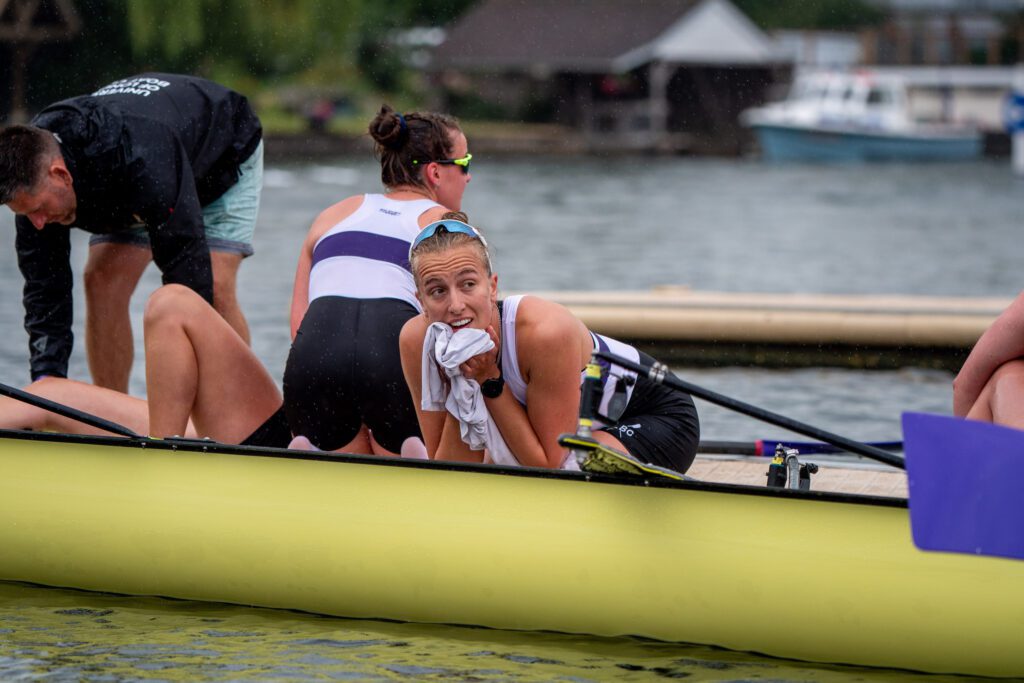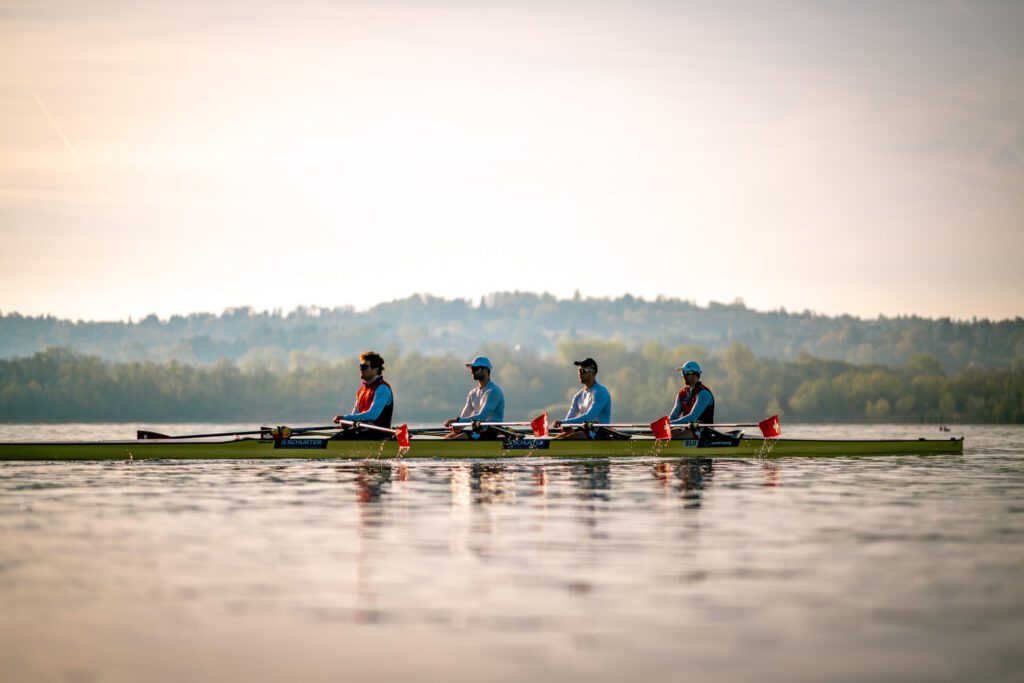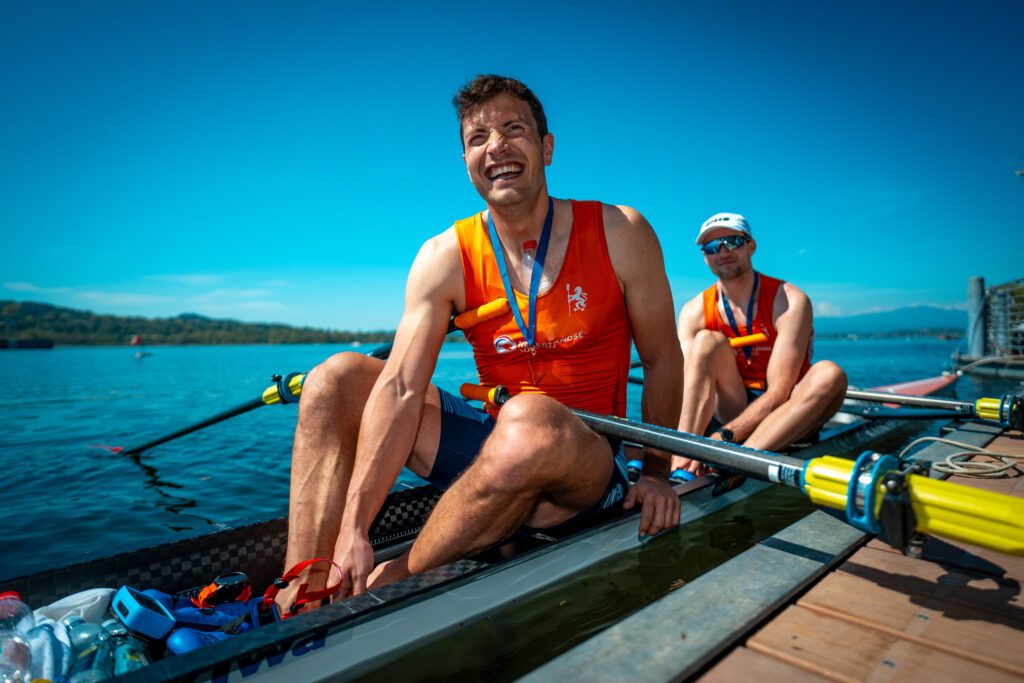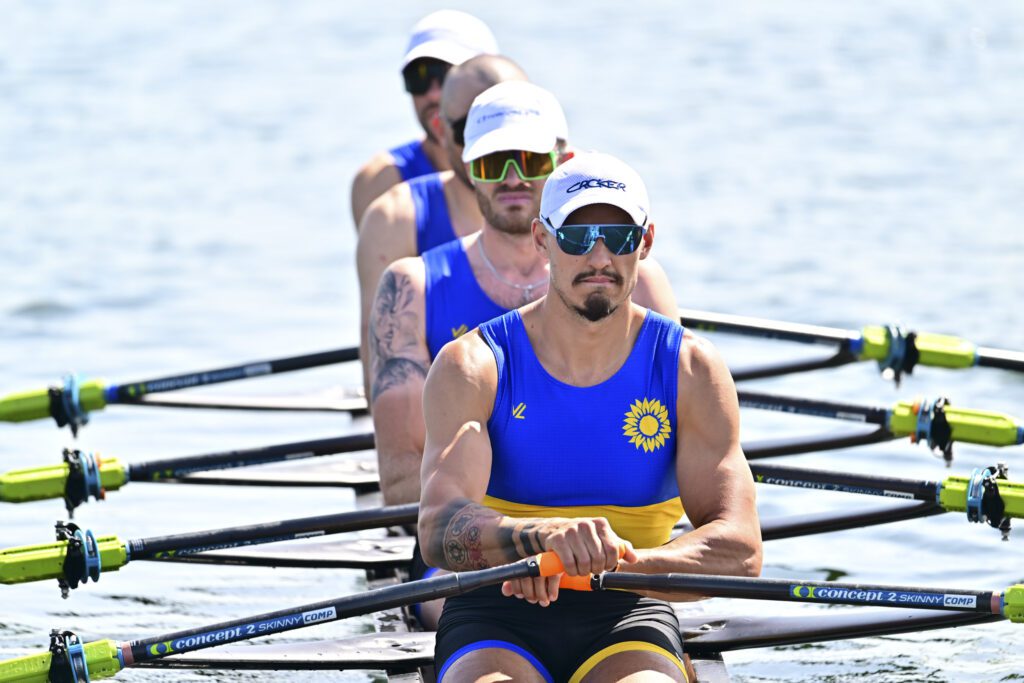There are times when rowing simply produces the goods, and just before the tea-break on Saturday was a stonker, Radley versus defending champions Eton in the Princess Elizabeth. Whose crews sat nervously on the start, not quite sure what would result given that Eton were nine seconds faster at National Schools, but Radley have since then been dark horses with limited racing, and had crew changes. The flag dropped, the crews sped off, and within a few strokes Eton had a slight lead they extended to near-clear water early on before Radley pinned them back to half a length. With cleaner strokes, Eton then eked it out to two-thirds of a length soon after Fawley, at which point the heavens opened and torrential rain began to fall, making the light head-wind drop completely.
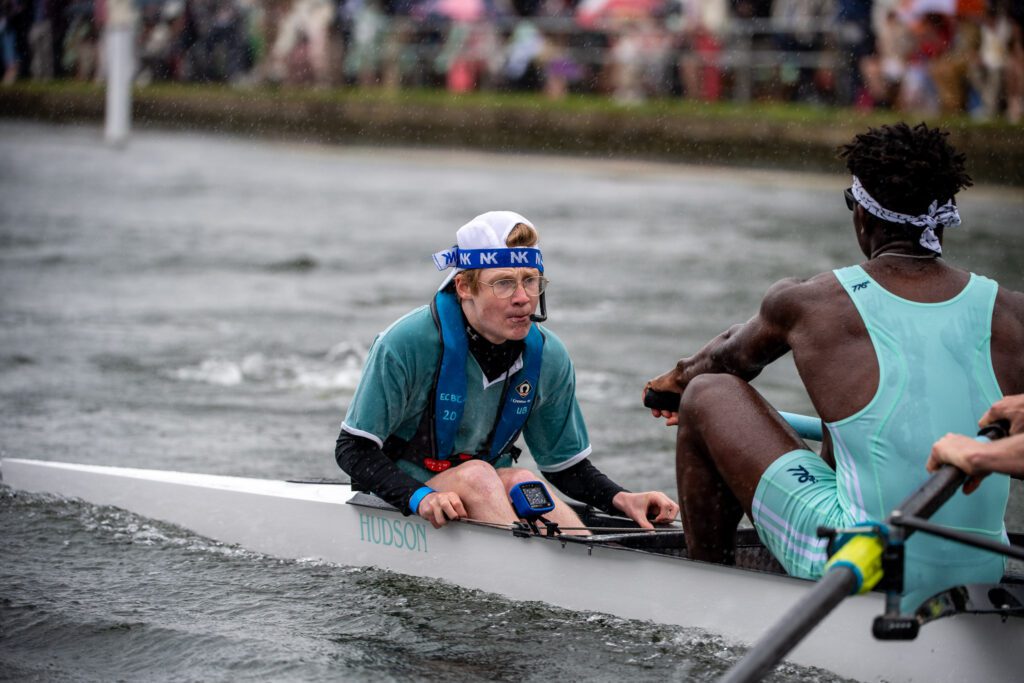
Photo Eton College in the Princess Elizabeth Challenge Cup.
Credit Benedict Tufnell
Sniffing an opening, Radley tested Eton with a little push before Upper Thames, which was answered but not perhaps quite convincingly. Radley went again, hardening their strokes in the water whilst underrating Eton. Steadily, stroke by stroke, they bored through, levelling as the Enclosures approached and surging into a canvas lead past the yelling crowds on the packed bank. Extraordinary racing, the result a quarter-length victory to Radley who had prevented Eton from claiming three Princess Elizabeth trophies in a row. Radley, who last won the event in 1998, now face St Paul’s, who rowed through King’s School Wimbledon in a fiercely fought race, and this could be an even more spectacular final than the semis.
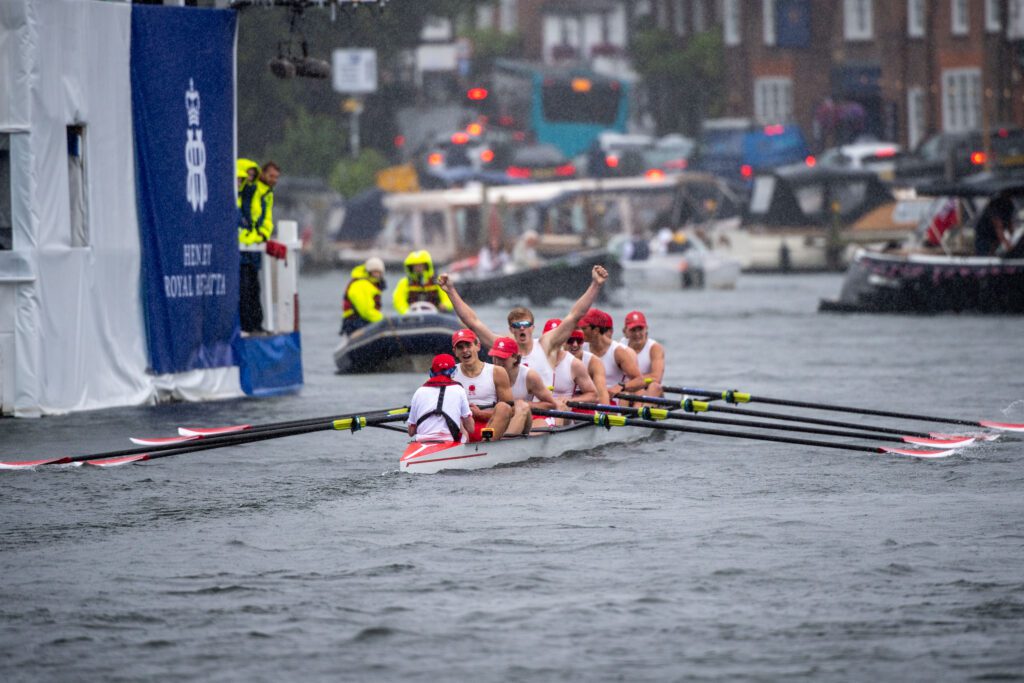
Photo Radley College deny Eton a shot at the three back to back wins in the Princess Elizabeth Challenge Cup.
Credit Benedict Tufnell
After that came a Grand semi-final between the British eight and a US California & Penn Athletic combination who had raced as the USA four and two pairs at the Poznan world cup. The GBR eight shouldn’t have needed to worry much after getting a length soon after Temple Island, but made it look like harder work when the US crew clung to them by rating higher, keeping to 37-38 the entire way up the course as has become common on the international circuit. GBR (well, Oxford Brookes & Leander) stayed at a steady 35-36 throughout, just a tad too relaxed to shake the challengers off, and the sprint closed it to overlap at the end. A notch or too more oomph will be needed not only against Rowing Australia on Sunday but also on the Rotsee next week in Lucerne.
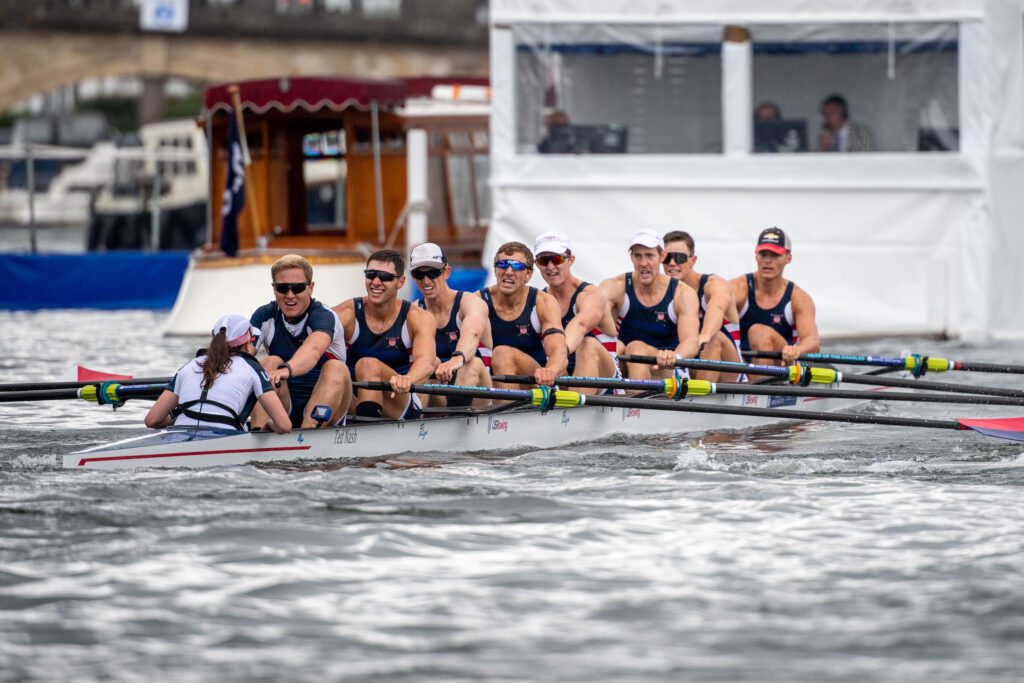
Photo A dogged effort from the American eight but not enough to deny Oxford Brookes and Leander a place in the final of the Grand Challenge Cup.
Credit Benedict Tufnell
Other members of the GBR national squad were in action, notably redoubtable lightweight and winning Boat Race stroke Imogen Grant, who surprised herself (though perhaps not all onlookers) by defeating openweight Olympic medallist Lucy Spoors in the Princess Royal, taking a quick lead and finishing with an ‘easily’ verdict. Spoors is from a sculling background, but after failing to qualify the NZL W4x for Tokyo, moved into the eights group, where they took silver in Japan. Now Grant faces American Kara Kohler, who came ninth in the Tokyo singles and broke the will of Azerbaijan’s Diana Dymchenko with a sustained push in the other semi-final.
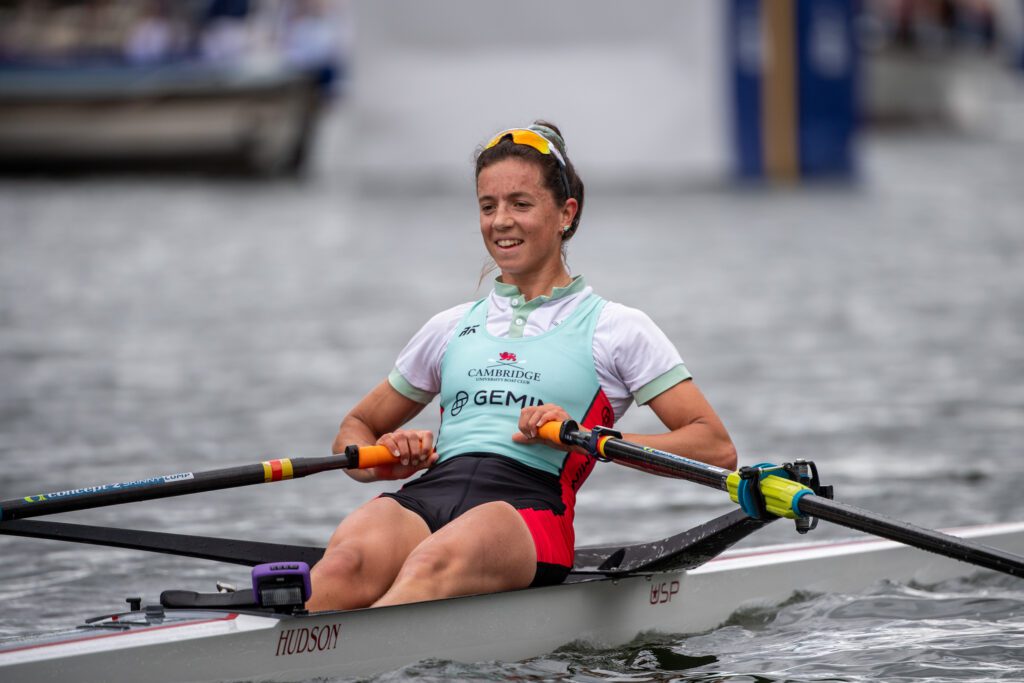
Photo A smiling Imogen Grant ends Lucy Spoors run in the Princess Royal Challenge Cup.
Credit Benedict Tufnell
The other race of the day was that between the two British men’s pairs, Cambridge oarsmen Ollie Wynne-Griffiths and Tom George up against Tokyo teammate Josh Bugajski and his new pairs partner Harry Glenister. Wynne-Griffiths and George have been out of Caversham this year, training with their Blue Boat squad, but are racing as GBR1 at the Lucerne world cup, having shown as top pair in Belgrade. They now want to stay in the pair rather than join the men’s eight since their exams finished, but have to prove it here and in Switzerland before selection is confirmed.
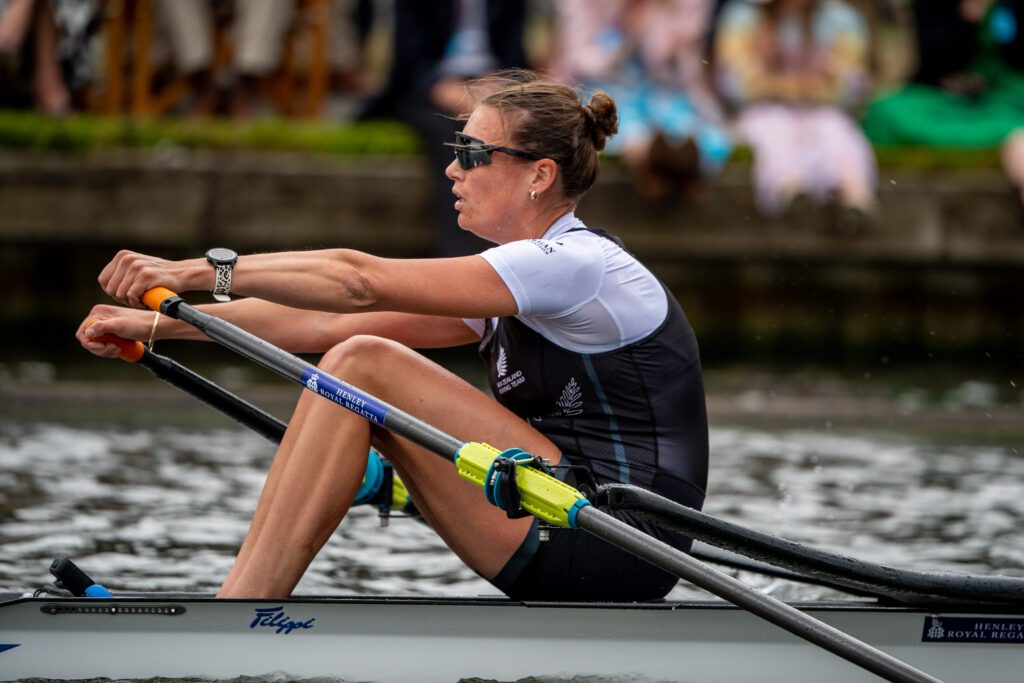
Photo Lucy Spoors in the Princess Royal Challenge Cup.
Glenister and Bugajski, a fast combination, swept out quickly into a half-length lead, but approaching the Barrier the Cambridge power had started to kick in, and they inched through into the lead, slowly extending it despite everything the Brookes/Leander pair could do. There was no giving in, you could see the determination on all four faces, but near the end Wynne-Griffith and George were able to relax a little, saving a smidgeon of energy for a final against what turned out to be the Kiwi pair Tom Mackintosh and Matt Macdonald, who defeated Oxford’s Liam Corrigan and Ollie Cook later in the afternoon.
“Guin Batten made it clear to Oxford that she felt she could have disqualified them earlier in the race.”
Rachel Quarrell
There was quite a kerfuffle in the second Visitors’ coxless fours semi-final, Washington having already beaten Thames and Leander by a length an hour before. The second race, between Oxford University’s Isis-based B crew and a very experienced and skilful Tideway Scullers/Molesey combination, was eventful from the first, the opening half involving clashes and warnings (one where Oxford were in the wrong, one with Scullers/Molesey in the wrong) and the decapitation of two unfortunate ducks who got in the way along the Island. Even after the Londoners had taken a three-length lead later on, the warnings continued for both crews. Oxford closed the gap to half that at the finish line, then promptly appealed after the race finished.
Talking to Oxford beside the press box gangway, umpire Guin Batten made it clear to Oxford that she felt she could have disqualified them earlier in the race for an infraction which led to contact, but no result was announced while the situation was considered in the Chairman’s office. After a wait of nearly an hour the result was announced: victory to Scullers/Molesey by a length and a half, ie the original finish order confirmed without anyone being disqualified.
Criticising coxes is not something I generally want to do, they get a hard enough time anyway. But there were some mystifyingly wayward lines steered by coxes of eights, so without naming names, let’s just point out that even very high wind does not send an eight off course by that much. Some of them steered very badly even without the excuse of wind, after it dropped later in the day when the rain began. At least one of the coxes has been seen to hit the booms several times during training so perhaps we shouldn’t be surprised, but not all of them lost on Saturday, so watch for interesting steering from the same culprits in Sunday’s finals.
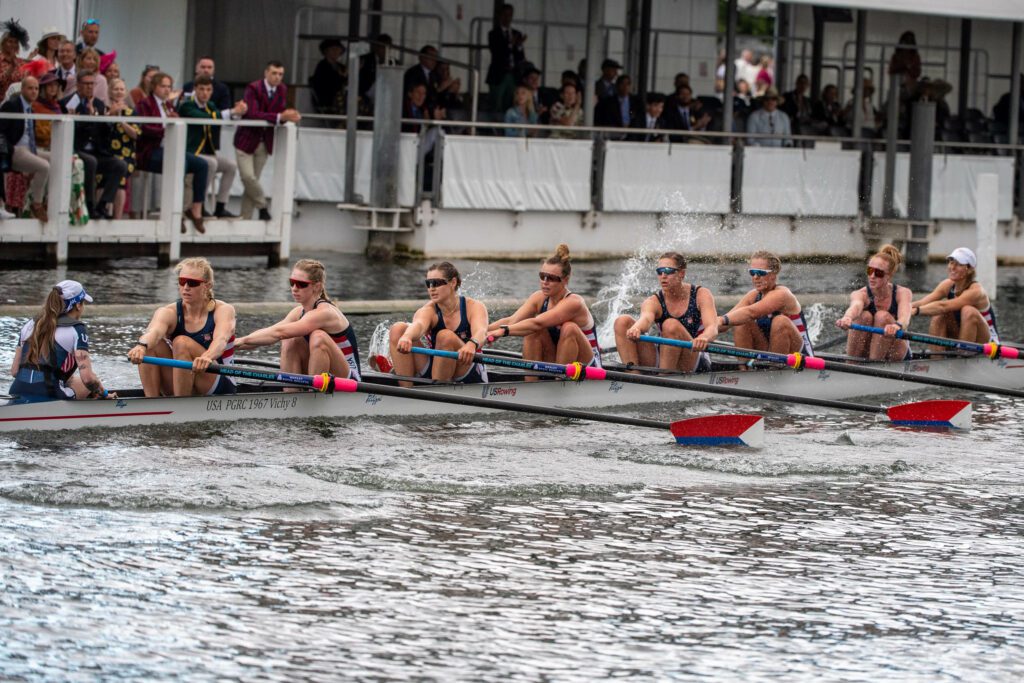
Photo US W8+ in their ‘Vichy 8’.
Credit Benedict Tufnell
The plethora of events gives a huge roster to discuss. In the open events the Remenham semis gave a chance for the British women’s sweep squad to show their coaches that an eight can go fast beating the US women’s combination of its recent four and pairs. The gamble paid off and Imperial/Leander won a close contest by 2/3 length, but they may find it harder work against Rowing Australia, who defeated China in the other semi. China’s men’s quad, current World Cup leaders, had to burn everything to beat a tweaked British men’s quad in the Queen Mother, while the US men beat New Zealand. The Princess Grace women’s quads saw Australia and China go through to the final, whilst Denmark will face New Zealand in the Town women’s fours.
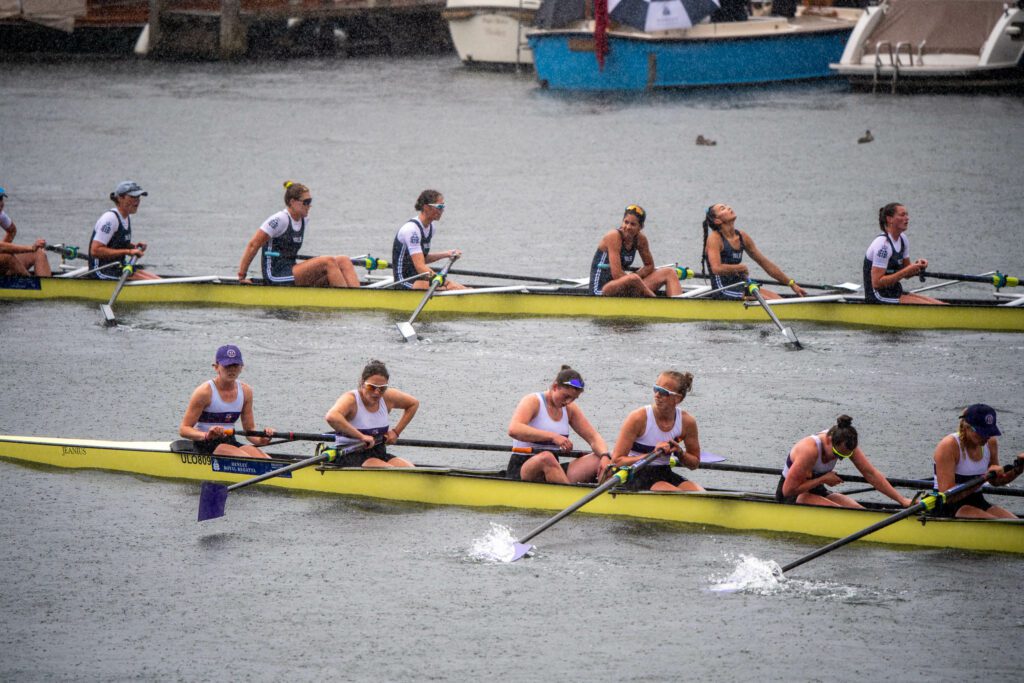
Photo Victorious Yale crew equally as exhausted as their UL opponents.
Credit Benedict Tufnell
In the student events Yale beat UL for a place in the final of the Island women’s university eights, but it took everything they had, and Brown had an easier ride against Brookes, perhaps because Brown are the quickest crew in the event. Washington’s 2V/3V combination were put through the wringer by an excellent Durham eight in the Temple, whilst Oxford Brookes continued their run of finals in this event by beating Dutchmen Triton. As ever the club events were tense and bitter contests, Molesey conquering Sydney by only 3/4 of a length in the Thames, while Thames A beat old rivals Leander by 2/3 of a length in the other semi to set up a classic final. The oarswomen of the latter’s two clubs will meet in the final of the Wargrave club women’s eights, while Windsor Boys pulled off a classic by getting their A and B crews into the final of the Fawley junior men’s sculls, a feat no club has ever before managed in the junior events.
